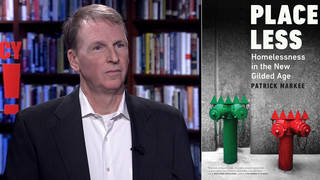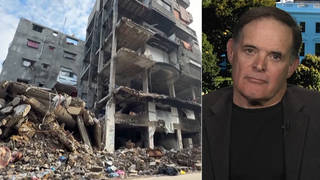
We host a roundtable discussion on the state of U.S.-Africa relations with three experts: Rev. Molefe Tsele of the South African Council of Churches, Muthoni Wanyeki of the African Women’s Development and Communications Network and Salih Booker of Africa Action. [includes rush transcript]
The British aid agency Oxfam is warning that 45 million children will die needlessly over the next 10 years because rich nations have failed to live up to promises to fight global poverty. The group has released a new report titled Paying the Price that reveals that inn real terms, the aid budgets of rich countries are half what they were in 1960. Oxfam is also estimating that poor countries are now paying $100 million a day in debt repayments.
We are going to spend the rest of the hour taking a look at the state of U.S.-Africa relations, the HIV/AIDS epidemic in Africa, the impact of Bush’s reelection, African foreign debt and how the war on terror has affected the continent.
- Rev. Molefe Tsele, General Secretary of the South African Council of Churches.
- Muthoni Wanyeki, Executive Director of the Kenyan-based African Women’s Development and Communications Network (FEMNET).
- Salih Booker, Director of Africa Action.
Transcript
AMY GOODMAN: We are joined by Reverend Molefe Tsele who is the General Secretary of the South African Council of Churches, by Muthoni Wanyeki, who is the Executive Director of the Kenyan-based African Women’s Development and Communications Network known as FEMNET, and Salih Booker joins us again; he is Director of Africa Action in Washington, D.C. We welcome you all to Democracy Now!
GUESTS: Thank you.
AMY GOODMAN: This issue of repayment. Muthoni Wanyeki, let’s begin with you and the debt. The amount of money, $100 million a day in debt repayment, that countries are paying now to the wealthier countries. What effect does that have on — you come from Kenya but also you talk about the continent.
MUTHONI WANYEKI: Well obviously, what it means is that money that should be available for public investment and health, education, general social services just simply is not available. And even though there have been efforts around the HIPC, the highly indicted poor countries initiative, it is clear that those initiatives are simply insufficient: (1) they are limited to a certain range of country, (2) they are tied to, as usual, conditions around the macroeconomic framework underlying how countries are able to structure their economies. So, calls for debt cancellation remain very high on the agenda.
AMY GOODMAN: Reverend Tsele, how has the Bush re-election been received in South Africa? How does it impact your country?
REV. MOLEFE TSELE: Well, at the state level the word we hear from the President Mbeki is that nothing will change. However, on the ground, there are very serious concerns. Firstly, there’s a growing presence of conservative evangelical American groups especially who are doing work on HIV/AIDS. But also there is an attempt to turn South Africa, which is one of the best democracies there, into possibly one of the sea of influence in the region so that in interventions in pro crisis areas such as the Great Lakes, basically the U.S. could continue to be involved through South Africa. And so there’s an ambivalence and I can safely say that in the streets of Soweto there was a great depression and sadness after the results came out of Ohio.
AMY GOODMAN: Muthoni Wanyeki, the effect in Kenya of — are you seeing the same kind of phenomenon, more evangelical groups both from Kenya and coming to Kenya from the United States?
MUTHONI WANYEKI: Definitely. I actually work for a Pan African organization so I should say this impact is being felt across the continent. It not just evangelical groups. What it means is that American bilateral cooperation money is increasingly tied to a religious right agenda in terms of how money is coming into HIV/AIDS, what kind of prevention strategies are being used and obviously this is at the expense of full demands for women’s reproductive and sexual rights, which are at the heart of HIV/AIDS pandemic.
AMY GOODMAN: How concretely does it impact them? What does it mean?
MUTHONI WANYEKI: What it means is that groups that are talking about the full range of reproductive and sexual rights including the right to choice, including the need for more than abstinence only approaches to prevention are simply having funding cut and it also means that states that have taken a fairly holistic approach in the past are no longer able to do so because this is the biggest pot of money coming into HIV/AIDS.
AMY GOODMAN: Salih Booker, you are here in the United States. You work directly on U.S. policy and on lobbying the government, educating people in this country. How are you dealing with this and to what extent do people here understand what is happening?
SALIH BOOKER: I think increasingly people do understand what is happening. Certainly on debt cancellation for example there have been movements in the United States seeking debt cancellation, the Jubilee 2000, which became the Jubilee USA network. And we expect that in the coming years we are going to be able to achieve some victories in terms of getting debt cancellation for at least 33 of the worlds most impoverished countries, the majority of whom are in Africa. But the other critical thing about debt, in African countries, they are spending more on repaying these old an illegitimate debts that come from the cold war era.
AMY GOODMAN: And who do they pay it to, how does it actually work?
SALIH BOOKER: It is largely to the World Bank and the IMF and rich country creditors like the US the UK and France but the vast majority is the World Bank and the IMF. Of course, those institutions are controlled by the rich countries, the G-7 countries. That is $15 billion a year out of the African continent. That is more money than is spent on healthcare in the face of this AIDS pandemic; that is more than is coming in the continent in the form of new aid or loans or direct investment. So you have this cruel irony where the poorest region of the world is subsidizing some of the wealthiest institutions and wealthiest economies in the world. But the other critical thing about debt, also about foreign assistance or aid, is the strings that come attached with it. Debt is used not just to drain resources out of Africa but as leverage to force African governments to implement economic policies that the West demands: Privatization of hospitals and public services, privatization of public utilities like water. So, it is a tool used to maintain and perpetuate this imbalance between the rich minority in the world and the impoverished majority in the world. So when we demand debt cancellation we are talking about unconditional debt cancellation. We are trying to move the discourse toward one of reparations and ask the question of who really owes whom. Is it the poor countries that owe the rich countries or is it really these wealthy countries that have amassed their surplus capital by exploited poor countries over the years. I would just say the same on HIV/AIDS. It is not just that we need more funding. Obviously there is a need for more funding but it needs to be funding that provided to the Africans that are on the front lines fighting this pandemic, not by imposing fundamentalist ideologies over science.
AMY GOODMAN: Muthoni Wanyeki, when the stress is abstinence, what is the problem with that?
MUTHONI WANYEKI: Well, the problem is, first of all, looking at the fact that the face of HIV/AIDS is increasingly of that of young African women. Infection rates of women between ages of 15 and 24 are three to four times higher than the male counterparts. So you have to look at why this has arisen. And obviously it has arisen because abstinence is not strategy that most young African women can follow even if they would choose to because of their own personal religious beliefs or whatever. The idea —
AMY GOODMAN: Isn’t the rate also increasing most among young married women?
MUTHONI WANYEKI: Exactly. And that again comes back to failures of the prevention approach. If you don’t recognize that most women cannot afford — do not have the capacity to negotiate sex and to demand abstinence or to demand uses of condoms, etc., then clearly we are not getting to the heart of the problem.
AMY GOODMAN: What is being done in South Africa, Reverend Tsele?
REV. MOLEFE TSELE: Well, maybe let’s firstly let us complete the picture about the debt issue. You are aware that the core of African debt, a bad advise is that African governments receive from the World Bank and IMF, and wastefully expenditure even by dictators mainly barely getting debt in order to procure services from U.S. companies and then those dictators Sese Mobutu and others then on the scene. But what has happened is, repeatedly the people have said, oh these are old years debts that were not used in the interest of the people which therefore must be repudiated. And the stock answer from them, World Bank, is no, it cannot happen. And now lets fast-forward to post-Saddam Iraq and the similar situation has happened, the government had procured debts and today the argument is they were not used for the Iraqi people and the first thing that the Bush administration did there was, these debts must be repudiated. No company — the government does not owe anybody. Exactly what we were demanding in Africa, which they said, no, no, it cannot happen. And so it these kinds of things that we say, in the post-election era we need to begin to look at the morality issues. And for an administration that prides itself as the frontrunner of a new morality including sexual morality, we need to begin to ask what is the balance or what is the core of that morality?
AMY GOODMAN: On that issue of debt repayment, on the issue of debt overall, was really President Clinton any better than President Bush? He went to Africa and really pushed through the African NAFTA. What are your thoughts?
SALIH BOOKER: Well, he certainly wasn’t any better. He had the same kind of rhetoric, he made promises of writing off so much debt for poor countries but the U.S. administration whether under Republicans or Democrats has the same approach. They want to be able to dictate the economic choices of the rest of the world in the interests of American transnational corporations, in the interest of the American economy. So even while the Clinton administration made promises about debt reduction it was still tied to the same kind of formula where the World Bank and IMF will reduce debt if countries will adopt the economic policies that Washington is prescribing.
AMY GOODMAN: Quick question to the Reverend Molefe Tsele about President Aristide, who is in exile now in South Africa. I must say I was stunned to say CNN last week in a casual comment of an anchor questioning their reporter in Port-Au-Prince because General Colin Powell made the surprise visit saying, well we all know that the U.S. backed the coup in Haiti against Aristide. That is the first time I have heard one of the networks talk about that but what about Aristide in South Africa now?
REV. MOLEFE TSELE: Lest start by saying that South Africa has taken a position that is going link itself to the continent and then therefore will play a role in the request of the African Union. And President Aristide is a guest in the country, which I need to say that is hugely welcomed by a lot of the people especially in the townships. He is a very popular person there. We see it as something that South Africa did at the request of the African Union. And so it is something that we welcome. But beyond that there continues to be a traveling thing about how he left Haiti. Did he leave voluntarily, did the people in Haiti take him out or did people from outside? We don’t know the truth about that. He himself has said, there needs to be an inquiry as to the events that let to his ouster and we know that even the UN has no interest in pursuing that and to us this is very troubling issue because it may be Aristide today and who will be next.
AMY GOODMAN: Finally, before we wrap up, Sudan and the impact it having on the whole continent. Muthoni, if you could respond to that and what you think needs to be done.
MUTHONI WANYEKI: I think the continent has tried to respond to Darfur. The African Union as you know took a decision to send in peacekeepers. They took a decision to send in a mission from the African Commission on Human and People’s Rights to investigate the spread of — the extent and form of human rights violations. I think that was extremely significant in terms of showing the shift at the intergovernmental level within Africa because it showed Africa was ready to hold Sudan to account for what is going on in Darfur. What is needed is support for the AU’s initiatives in this area. They simply don’t have the resources to send in the kind of force that is needed. The also need to expand the mandate of the force so that it is more that sort of just monitoring the situation on the ground and that it is actually able to protect civilians. I think the UN has responded well in a humanitarian sense but we need the political leadership backed by resources under the AU banner.
AMY GOODMAN: Salih Booker, having concluded your meeting with African Americans and Africans setting an agenda in the new Bush years in Washington, what have you concluded will be a strategy for dealing with Sudan and Darfur?
SALIH BOOKER: Specifically on Sudan and Darfur, we agree quite frankly with what Muthoni just said. The African Union is providing leadership. It lacks the resources much of what the United States could provide. And we need to be mobilizing people to demand that the United States support and follow the leadership of the African Union, that Americans need to know that American power can be put to good use if it is joined with the efforts of the African nations, that the United States cannot solve the world’s problems but that we can contribute our power to the collective efforts of others and this is a critical issue that has to be addressed in the Sudan.
AMY GOODMAN: I want to thank you all for joining us, Salih Booker of Africa Action, Reverend Molefe Tsele, general secretary of the South African Council of Churches and Muthoni Wanyeki, Executive Director of the Kenyan-based African Women’s Development and Communication Network, known as FEMNET.













Media Options